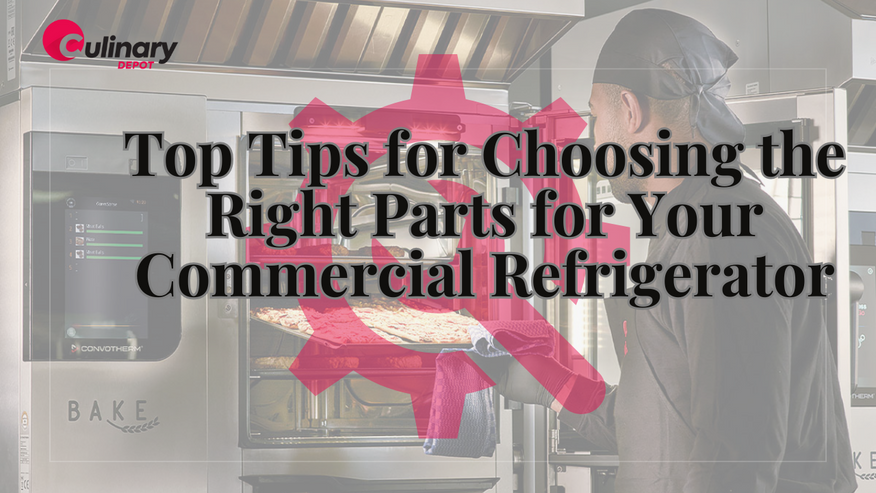Feb 15th 2024 - Team Member
Top Tips for Choosing the Right Parts for Your Commercial Refrigerator
In the bustling world of commercial kitchens, the refrigerator is the heart of operations. Whether you're a restaurant owner, managing a sandwich shop, or running a food truck, ensuring your refrigerated space operates at optimal temperatures is crucial. From walk-in coolers to undercounter units, the right parts not only prevent food spoilage but also enhance energy usage and storage space. This guide will delve into the essentials of selecting the right components for your commercial fridge, incorporating key aspects such as digital thermostats, door types, and maintenance practices.
Understanding Your Refrigerator's Needs
Identifying the Type and Size
Commercial refrigeration comes in various forms, including walk-in refrigerators, counter refrigerators, and merchandising refrigerators. The size, measured in cubic feet, dictates the storage capacity, impacting the quantities of food you can store and the accessibility to food stock.
Recognizing Common Features
Commercial units often come with features like digital temperature controls, self-closing doors, and glass or solid doors. Understanding these common features helps in selecting parts that enhance functionality and efficiency.
Selecting Quality Parts
Door Types: Glass vs. Solid Doors
The choice between glass doors and solid doors affects visibility and insulation. Glass doors offer easy visibility of food items, ideal for merchandising refrigerators and bar refrigeration units. Solid doors provide better insulation, suitable for larger units and walk-in coolers.
Temperature Control: Digital Thermostats
Digital thermostats offer precise temperature settings, crucial for maintaining correct temperatures and preventing harmful bacteria growth. They are essential for units storing perishable items and ensure consistent temperature fluctuations.
Compressor Location: Top-Mounted vs. Bottom-Mounted
The compressor location affects the performance and energy efficiency of commercial fridges. Top-mounted compressors are ideal for cooler environments, while bottom-mount units are easier to clean and maintain.
Evaluating Suppliers and Installation
Choosing Reputable Suppliers
Select suppliers with expertise in commercial refrigeration. They should offer a wide variety of parts and provide professional installation services.
Importance of Professional Installation
Proper installation ensures maximum efficiency and prevents costly repairs. Ensure electrical connections and circuit breakers are correctly set up to handle the energy requirements of commercial units.
Maintenance and Cleaning
Regular Maintenance and Cleaning
Regular maintenance and cleaning are vital for the longevity of your refrigerator. This includes deep cleaning, checking fan blades, and replacing air filters.
Cleaning Coils and Avoiding Harsh Chemicals
Dirty coils can lead to increased energy usage and reduced efficiency. Clean coils with a soft brush and avoid harsh chemicals that can damage parts.
Energy Efficiency and Cost Considerations
Energy-Efficient Models vs. Standard Models
Investing in energy-efficient models can reduce the cost of ownership over time. Look for advancements in refrigeration technology that offer better insulation and energy usage.
Understanding the Cost of Repairs
Be aware of the potential costs of repairs. Regular maintenance can prevent the need for expensive repairs, ensuring the longevity of your commercial refrigerator.
Specialized Refrigeration Needs
Walk-In Coolers and Larger Units
For commercial kitchens with significant storage needs, walk-in coolers and larger units are essential. Ensure that these units have features like digital thermostats and solid doors for optimal temperature control and insulation.
Refrigerated Prep Tables and Undercounter Refrigerators
Refrigerated prep tables and undercounter refrigerators are common in sandwich shops and small kitchens. They provide additional refrigerated space without taking up excessive floor space.
Remote Refrigeration and Advanced Systems
Remote refrigeration and advanced refrigeration systems offer solutions for businesses with specific needs, such as food trucks or bars. These systems provide flexibility and efficiency in managing food storage.
Conclusion
Choosing the right parts for your commercial refrigerator is a critical decision that impacts food safety, energy efficiency, and the overall operation of your commercial kitchen. By considering factors like door type, temperature control, compressor location, and energy efficiency, you can ensure that your refrigerator meets the demands of your business. Regular maintenance and cleaning are also essential to prolong the life of your refrigerator and prevent costly repairs. With the right approach, you can maintain optimal temperatures, prevent food spoilage, and keep your commercial kitchen running smoothly.

